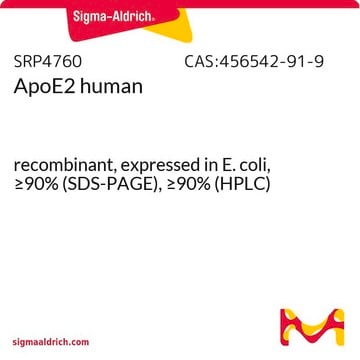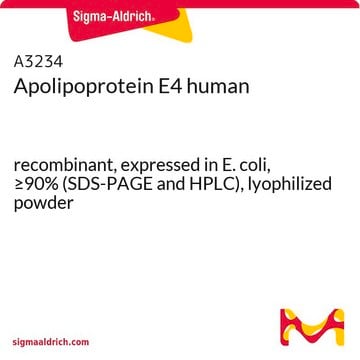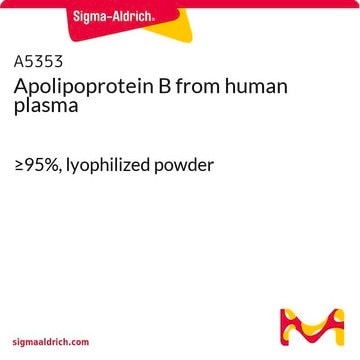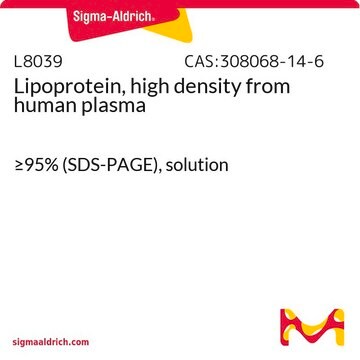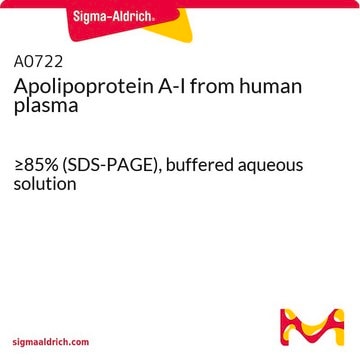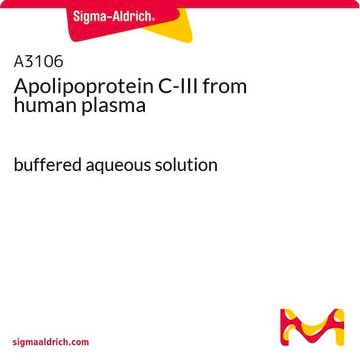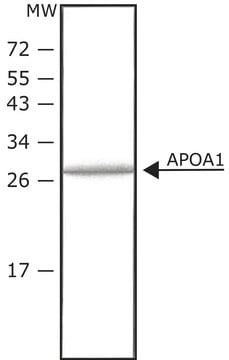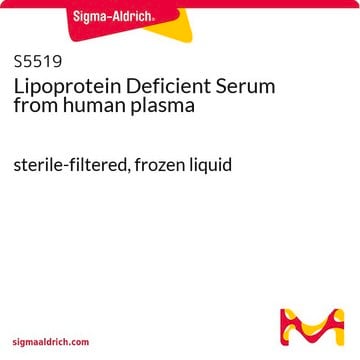SRP6303
Apolipoprotein E from human plasma
≥95% (SDS-PAGE)
Synonym(s):
ApoE
Sign Into View Organizational & Contract Pricing
All Photos(1)
About This Item
UNSPSC Code:
12352202
NACRES:
NA.32
Recommended Products
General description
Apolipoprotein E (ApoE) is an important constituent of all plasma lipoproteins. The concentration of Apo E in normal plasma is 5 mg/100mL. Significant quantities of ApoE are produced in liver and brain and to some extent in almost every organ. It exists in three major isoforms; E2, E3, and E4, which differ from one another by a single amino-acid substitution. The gene encoding this protein is localized on human chromosome 19q13.32.
Biochem/physiol Actions
Apolipoprotein E (ApoE) serves as a ligand for low density receptors and participates in the transport and redistribution of cholesterol and other lipids. Other functions include immunoregulation, cell growth modulation and differentiation. Apo E is thought to be involved in tissue repair as increased amounts of the protein are found at sites of peripheral nerve injury and regeneration. A mutant form is associated with familial type III hyperlipoproteinemia. In addition to facilitating solubilization of lipids, these proteins help to maintain the structural integrity of lipoproteins, serve as ligands for lipoprotein receptors, and regulate the activity of enzymes involved in lipid metabolism. ApoE′s interaction with specific ApoE receptor enables uptake of chylomicron remnants by liver cells, which is an essential step during normal lipid metabolism. It also binds with the low-density lipoprotein (LDL) receptor (apo B/E).
Physical form
Frozen in 50 mM NH4HCO3, pH 8.0.
Storage Class Code
11 - Combustible Solids
WGK
WGK 3
Flash Point(F)
Not applicable
Flash Point(C)
Not applicable
Certificates of Analysis (COA)
Search for Certificates of Analysis (COA) by entering the products Lot/Batch Number. Lot and Batch Numbers can be found on a product’s label following the words ‘Lot’ or ‘Batch’.
Already Own This Product?
Find documentation for the products that you have recently purchased in the Document Library.
Customers Also Viewed
Genome-wide association study identifies a single major locus contributing to survival into old age; the APOE locus revisited.
Deelen J
Aging Cell, 10(4), 686-698 (2011)
Pathogenesis of type III hyperlipoproteinemia (dysbetalipoproteinemia). Questions, quandaries, and paradoxes.
Mahley RW
Journal of Lipid Research, 40(11), 1933-1949 (1999)
Karol Kaiser et al.
Nature communications, 10(1), 1498-1498 (2019-04-04)
WNTs are lipid-modified proteins that control multiple functions in development and disease via short- and long-range signaling. However, it is unclear how these hydrophobic molecules spread over long distances in the mammalian brain. Here we show that WNT5A is produced
Apolipoprotein E-low density lipoprotein receptor binding: study of protein-protein interaction in rationally selected docked complexes.
Prevost M and Raussens V
Proteins: Structure, Function, and Genetics, 55(4), 874-884 (2004)
Apolipoprotein E isoforms and lipoprotein metabolism.
Phillips MC
IUBMB Life, 66(9), 616-623 (2014)
Our team of scientists has experience in all areas of research including Life Science, Material Science, Chemical Synthesis, Chromatography, Analytical and many others.
Contact Technical Service